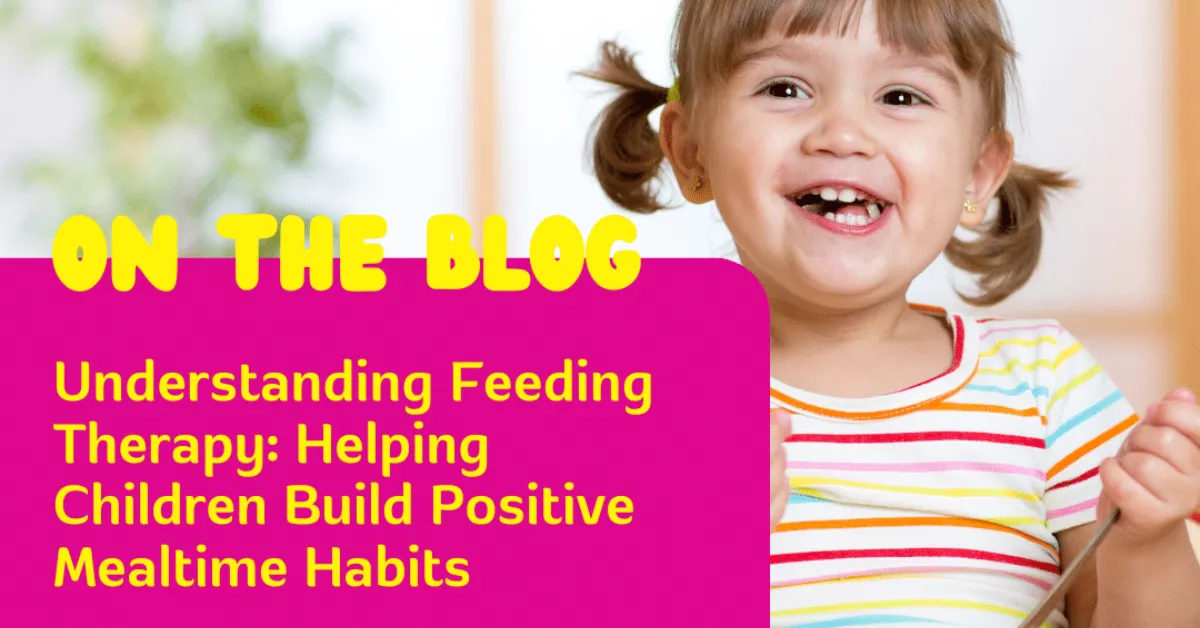You’re not imagining it, mealtimes with your toddler really have become a battle. Maybe your little one gags at anything green, or they’ve been eating the same five foods for months. Perhaps dinner ends in tears (yours and theirs) more often than not. If you’ve reached the point where you’re Googling “feeding therapy” at 2 AM, this guide is for you.
Let’s walk through everything about feeding therapy for toddlers, the real costs nobody talks about, what actually happens in sessions, and honest timelines for seeing change.
When Your Child DOESN’T Need Feeding Therapy: Normal Picky Eating vs. Clinical Feeding Disorder
Here’s the thing: almost every toddler goes through a picky phase. Your pediatrician has probably told you this. But how do you know if it’s crossed the line from “normal toddler behavior” to something that needs professional help?
Think about typical picky eaters. Sure, they might push away broccoli or insist on only eating chicken nuggets shaped like dinosaurs. They’re stubborn about brands; it has to be that specific macaroni. But here’s the key difference: they’re still eating at least 30 different foods across various food groups. They’re growing fine. They might complain when you put peas on their plate, but they don’t have a complete meltdown.
Now, when things have crossed into feeding disorder territory, it looks different. Research tells us that about 20% of kids struggle with eating difficulties before they turn seven, and roughly half of those children won’t just “grow out of it” like everyone keeps promising you they will.
Your gut is probably already telling you something’s wrong if your toddler only accepts 10 or fewer foods total. Or if they literally cannot tolerate new foods on their plate, we’re talking real distress here, not just whining. Maybe they gag or even vomit when they encounter certain textures. Or perhaps they’ve started losing weight or dropping off their growth curve.
The bottom line? Normal picky eating is frustrating. Feeding disorders are frightening. Trust your instincts on which category your child falls into.

Who Can Benefit from Feeding Therapy? (Warning Signs by Age)
Feeding problems show up differently depending on how old your child is. Here’s what to watch for:
For babies between 6-12 months: Does feeding time feel like it takes forever, like you’re sitting there for 45 minutes trying to get them to finish? Do they cough and gag a lot during meals? Maybe they flat-out refuse puréed foods or won’t even open their mouth when you bring the spoon close. And finger foods? Forget it they won’t touch them.
For toddlers aged 1-3 years: This is when things often become really obvious. Your child might be surviving on fewer than 15 foods. They can’t figure out how to drink from a straw, no matter how many times you’ve tried to teach them. Certain food groups, such as all vegetables or all proteins, are completely off the table. New foods genuinely upset them, not just make them resistant. And worst of all, instead of gaining weight like they should be, they’re losing it or staying stagnant.
Kids with autism often need feeding therapy for toddlers because sensory issues make eating genuinely overwhelming for them. The same goes for children dealing with sensory processing disorders or oral motor delays; their brains and bodies just process eating differently.

How Much Does Feeding Therapy Really Cost? (The Complete Financial Breakdown)
Okay, let’s talk money. This is probably one of your biggest questions, and frustratingly, most articles dance around the actual numbers.
Here’s what you’re looking at based on current 2024-2025 rates from therapy centers across the country:
For that first evaluation, where they assess your child and figure out what’s going on, you’ll pay somewhere between $300 and $600. These sessions run about 1.5 to 2 hours, so they’re thorough.
Regular therapy sessions vary quite a bit. A standard 55-minute session typically costs $135 to $200 at most places. Some centers charge $230 to $280 for specialized feeding therapy for toddlers because it requires extra training. If you opt for shorter 45-minute sessions, you’re looking at $90 to $135 per visit.
Now for the hard part, the total investment. How long will your child need therapy? Well, that depends entirely on how severe their feeding issues are.
For milder problems like a kid who eats okay but needs more variety, you might be done in 3 to 6 months. That’s roughly 12 to 25 sessions, so figure somewhere between $1,600 and $5,000 total.
Moderate to severe feeding challenges? You’re realistically looking at 6 months to 2 years of weekly sessions. Yes, that could mean $3,500 to $14,400 or more. I know it’s a lot.
But here’s the insurance piece: Many insurance plans will cover feeding therapy for toddlers if your pediatrician documents it as medically necessary. After you hit your deductible, most plans cover 50% to 80% of the cost. That usually translates to families paying $20 to $50 per session out of pocket.
The billing code your therapist will use is CPT 92526 for ongoing feeding therapy. When you call your insurance company (and you should, before starting), ask specifically about coverage for this code.
A few things that’ll affect whether insurance pays:
- You’ll probably need a referral from your pediatrician
- In-network providers mean way less out-of-pocket cost
- Some plans cap therapy visits at 20 or 40 per year
- They might require pre-authorization before you start
What if insurance won’t cover it? Ask your therapy clinic about payment plans. Many offer them. Some use sliding scale fees based on your income. If your toddler is under 3, check your state’s early intervention program to see whether services might be free or low-cost. Some nonprofits offer grants specifically for feeding therapy.
Real Parent Success Stories: Feeding Therapy Journeys from Start to Finish
Let me share some real stories, because sometimes you just need to hear that this actually works for other families.
Sarah’s story: At four years old, Sarah would only eat five foods, all bland, all the same color. If someone put a new food on her plate, she’d have a complete meltdown. Her mom took her to Green Leaf Therapy, where they used sensory integration techniques. It took six months, but Sarah now eats more than 20 different foods. Her mom says, “I can’t believe we used to fight about every single meal. Now Sarah actually asks to try new things sometimes.”
Otto’s journey: Otto used to eat pretty normally, but then suddenly his diet narrowed to only specific brands of specific foods. He couldn’t even stay at the dinner table; he’d bolt. His parents tried the SOS approach for feeding therapy for toddlers, which teaches kids how to prepare their bodies before eating. Several months in, Otto can now help make dinner and actually sits through family meals. The fight-or-flight response he had around food? Gone.
Emma’s progress: Three-year-old Emma couldn’t chew. At all. She was still drinking from bottles and would only accept puréed baby food. Her parents felt completely stuck. After 19 weeks of feeding therapy for toddlers with a specialized dietitian, Emma can now chew solid foods and eat what the rest of the family eats. Her parents say the best part is watching her confidence grow along with her skills.
What do all these stories have in common? The parents caught it early, they showed up consistently, and the therapy was tailored to their specific child’s needs.
How Does Feeding Therapy Work? (The Complete Process Explained)
So what actually happens if you decide to move forward?
First, you’ll need a referral from your pediatrician. Then you’ll schedule an initial evaluation, which takes about 1.5 to 2 hours. The therapist will watch your child eat both foods they like and foods they don’t. They’ll look at oral motor skills, how well your toddler can chew and move food around in their mouth. They’ll assess sensory processing and ask detailed questions about your child’s medical history and eating development.
Bring foods your child loves and foods they hate to this appointment. Bring their regular cup and utensils too. If you’ve been wondering Does my child need occupational therapy? “, the evaluation will help determine if your child’s challenges are sensory-based, motor-based, behavioral, or a mix.
What therapy sessions look like: Most feeding therapy for toddlers involves weekly visits lasting 45 to 60 minutes. Some intensive programs pack in daily sessions over 2-3 weeks, but that’s less common.
Here’s the crucial part you have to stay for the sessions. This isn’t drop-off therapy. You’re learning right alongside your child because you’ll need to practice these strategies at home. Remember, the therapist only has your child for one hour per week. The real work happens at your kitchen table.
A typical session starts with sensory warm-up activities. Then there are oral motor exercises to strengthen the muscles needed for chewing. Your child will explore food through play, no pressure to eat it, just getting comfortable around it. They’ll practice specific skills, and meanwhile, the therapist is coaching you on what to do at home.

Proven Feeding Therapy Techniques & Approaches
Different therapists use different methods. Here are the main ones:
The SOS Approach (Sequential Oral Sensory) is probably the most popular right now. Dr. Kay Toomey developed it, and it’s based on the idea that eating doesn’t start when food goes into your mouth. It starts way before that. First, your child has to be okay with food existing near them. Then they learn to interact with it without touching. Then they handle the smell. Then they touch it with their hands, their body, their mouth. Only after all that do they taste it, and eventually chew and swallow. This method takes longer but tends to stick better, especially for kids with sensory issues.
Beckman Oral Motor Approach is more about the physical mechanics. It focuses on strengthening and coordinating the lips, jaw, and tongue through specific exercises. If your child’s issue is more about motor skills for eating than sensory aversions, this might be the way to go.
Behavioral methods are the old-school approach, where your child gets rewards (stickers, small toys, praise) for trying new foods. It can work faster initially, but research shows the results often don’t last as long as child-led approaches.
Intensive multidisciplinary programs bring in the big guns for severe cases: psychologists, occupational therapists, speech pathologists, and nutritionists, all working together. These programs show about 71% success rates for weaning kids off feeding tubes and getting them to eat by mouth.
Choosing the Right Feeding Therapist: 12 Essential Questions to Ask
Not all feeding therapists are created equal. Here’s what to ask before you commit:
- What training do you have specifically in pediatric feeding disorders? (Graduate school alone isn’t enough; they need specialized certifications.)
- How long have you been working with kids who have feeding issues?
- What’s your approach, SOS, Beckman, behavioral, or something else?
- Can you tell me about your success rate with kids like mine?
- How often will we meet, and what’s a realistic timeline for our situation?
- What will my role be? (If they say you don’t need to attend sessions, that’s a red flag.)
- How will you track progress so I can see what’s working?
- Do you take my insurance? Are you in-network?
- What happens if we’re not seeing results after a few months?
- Can you connect me with other families you’ve worked with?
- Do you work with other specialists like our pediatrician or a GI doctor?
- How do you handle it when my child refuses to cooperate?
Warning signs: Run if a therapist forces food into your child’s mouth, promises quick fixes, won’t let you observe sessions, or can’t clearly explain their methods.
What “Success” Actually Looks Like: Realistic Timelines & Outcomes
Let’s set realistic expectations here, because I think a lot of parents get discouraged when things don’t improve overnight.
For mild feeding issues like your child eats enough but needs more variety, figure on 3 to 6 months of feeding therapy for toddlers. You’ll probably see them go from eating 15-20 foods to 30 or more. They’ll be more willing to try new stuff, and mealtimes will be way less stressful.
For moderate problems, significant restrictions, and maybe some growth concerns, think 6 to 12 months. You’re looking at your child finally accepting food groups they’d completely avoided. Their chewing and swallowing will get stronger. Growth will normalize. And they’ll be able to eat in different places, not just at home.
For severe issues like tube feeding or extreme selectivit,y be prepared for 12 to 24 months. But here’s the good news: research shows 71% of kids successfully wean off feeding tubes with proper intervention. The vast majority learn to eat enough food by mouth to stay healthy.
What progress actually looks like month by month:
In the first three months, you’re mostly building trust. Your child is learning to tolerate new foods being around. You’re not expecting them to eat much yet maybe they’ll touch a food or smell it. You’re learning strategies to use at home.
Months three through six? That’s when things start getting exciting. You’ll see them accept new textures. The tantrums at mealtime decrease. Coordination improves. They might actually put food in their mouth without gagging.
By six to twelve months in, you’ve got real momentum. Your toddler is consistently eating new foods. They’re feeding themselves better. They can eat at Grandma’s house or at restaurants, not just at home. And honestly, you’re way less stressed.
One thing therapists don’t always tell you: research shows that even one slight improvement in how your child interacts with food can take 5 to 10 weeks. So if you’re three weeks in and nothing’s changed, that’s actually normal. Stick with it.
How do you know when you’re done? Most programs aim for your child to eat 10 different starches, 10 proteins, and 10 fruits or vegetables, and to be able to eat these foods anywhere, not just at therapy or at home. Plus, they should be able to taste new foods without falling apart emotionally.
Feeding therapy for toddlers isn’t a magic fix, and the journey isn’t always smooth. Some weeks you’ll make progress. Other weeks, you’ll feel like you’re sliding backward. That’s normal. But with the right therapist, consistent at-home practice, and patience (so much patience), most feeding challenges improve dramatically. The goal isn’t perfection, it’s helping your child develop a healthier, happier relationship with food, so mealtimes can be about connection instead of combat.

